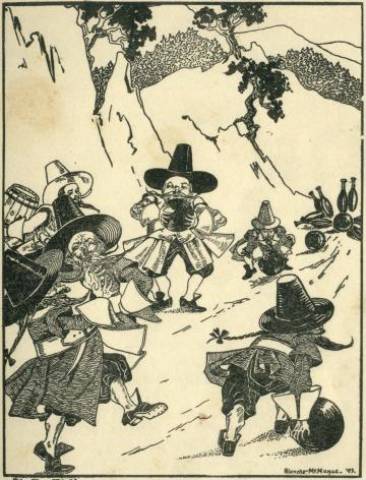1999-2002
(Return to Web Text-ures)
Tales Told in Twilight
Content Page
Click Here to return to
the previous section

(HOME)
1999-2002 (Return to Web Text-ures) |
Click Here to return to Tales Told in Twilight Content Page Click Here to return to the previous section |
 (HOME) |
RIP VAN WINKLE AND HIS LONG NAP.
 RIP VAN WINKLE Past New York, right up the Hudson River, you come to great mountains--called the Catskills--which are otherwise known as the "Kaatsberg." Long ago there lived in a village, at the foot of one of these tree-clad hills, a Dutchman named Rip Van Winkle, who had a wife, a grumbling, bad-tempered woman; a son, a young Rip; and a blue-eyed daughter, whom he loved dearly. The old Rip was a lazy, good-natured fellow, fond of sitting outside the village inn and gossiping in the shade beneath the sign.board which bore a portrait of King George III., for America was then an English colony. One summer evening when poor Rip Van Winkle had been scolded by his wife, who had routed him out of his favorite seat, he scrambled up the mountain for peace and quiet with his dog and his gun, and threw himself on a green knoll, and dozed. He was aroused by hearing some one call "Rip Van Winkle! Rip Van Winkle!" His dog Wolf growled and skulked to his master's side, as a curious dwarf approached them carrying a keg of liquor on his shoulders; he made signs for Rip to help him carry his burden up the mountain, and they climbed in silence, broken only by long rolling peals like distant thunder, until they came to an open space, where Rip saw a company of odd-looking personages playing at nine-pins. They were dressed in short doublets, with great knives stuck in their belts, and wore enormous breeches, each had a long beard and a queue, and each wore a high-pointed hat, with a crown like a sugar-loaf and a broad brim. By and by they induced Rip to join them, and he found the noise he had taken for thunder was caused by their balls as they rolled along the mountain sides. After awhile they offered him a flagon of hollands, which he drank and fell down in a deep sleep. When he woke it was bright sunshine, his first thought was, What excuse shall I make to Dame Winkle? He looked round for his gun, but in place of the clean, well-oiled fowling-piece, he found an old firelock, its barrel crusted with rust, its lock falling off, and the stock worm-eaten. Wolf was gone, not in spite of his whistling could he bring him back. As he clambered down toward the village, the people he met seemed dressed in a different fashion from that he had known, and they all stared at him and stroked their chins. As Rip did the same he found he had a beard a foot long. He approached his house, it had fallen into ruins; a half-starved dog snarled at him, and Rip was sad to find that Wolf, as he thought, had forgotten him. He called for his wife, but no answer came. So he strolled on to the village inn, but in place of the quiet little house, he found a great building with a flag of stars and stripes fluttering above it, and a sign with a head, entitled "General Washington." He asked in vain for his old friends. "Does nobody here know Rip Van Winkle?" he shouted. "Oh, yes, there he is," said two or three voices at once, and he looked up and saw a man exactly like he was when he went up the mountain. Then he saw a comely woman, and as she spoke to her little boy, "Hush, Rip, the old man won't hurt you," he seemed to know her voice. "What was your father's name?" he said. "Ah, poor man, Rip Van Winkle was his name, but it's twenty years since he went away from home with his gun, and has never been heard of since his dog came home without him." "Where is your mother?" he asked. "She died some time ago", she replied. "I am your father," the poor man said; and then a very old woman came forward and said: "Sure enough it's Rip Van Winkle himself. Well, old neighbor, where have you been these twenty years?" But nobody believed the story he told, yet they were kind to him, and he soon grew very happy, for there was no cross Dame Van Winkle to worry him; and if any one wants to know more about him, a famous writer named Washington Irving has told the story much better than it is told here in his "Sketch-Book." Click to continue to the next chapter of Tales Told in Twilight.
|